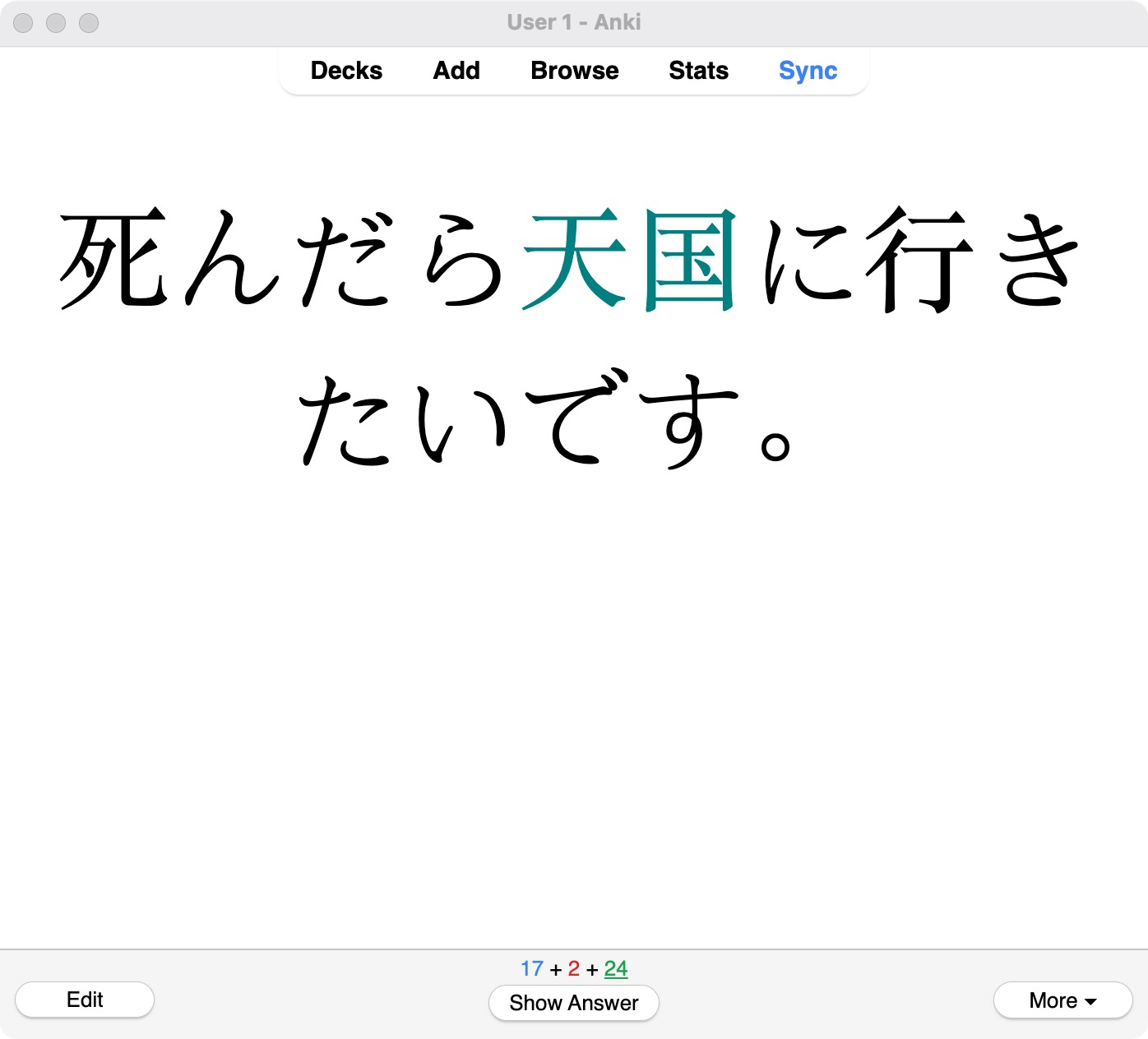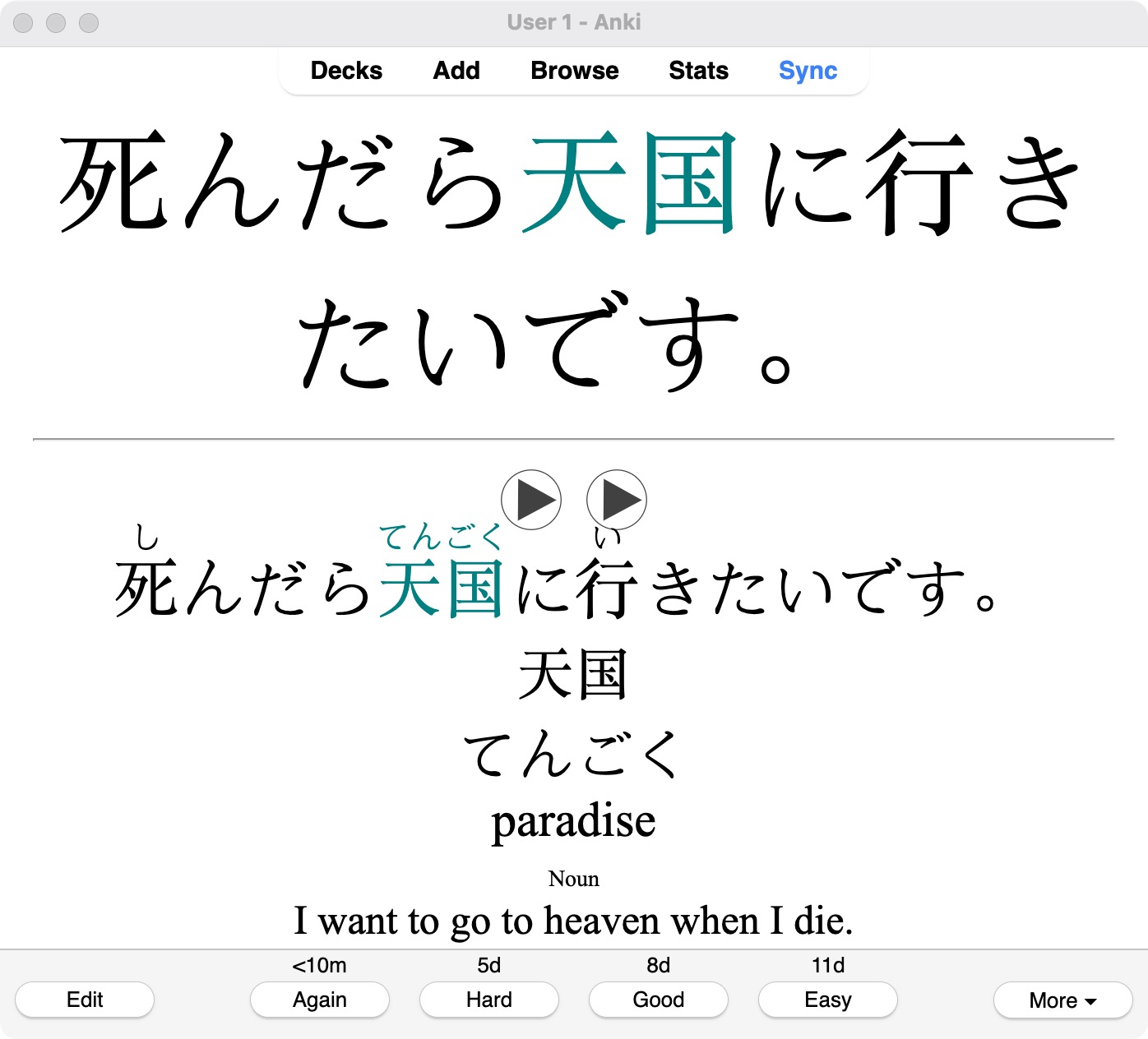Efficiently Learning Japanese
A typical roadmap of learning japanese begins with Kana (hiragana/katakana)(although I don’t see remembering katakana as being more important than Kanji, I think katakana can take a backseat role), after which the task usually branches into Kanji/Corewords/Grammar. The first of which endeavor seems straight forward, as even a cursory look into any web browser will have you greeted with a pletora of tailored resources. In this regard I recommmend Tofugu, it covers (hiragana/katakana) down to last detail, with quizes nontheless. However, I don’t think one should approach Core vocabulary or grammar with the idea of forced memorization.
Ideally, some tools may greatly help to that effect. Specifically, what I want is:
- It presents words in context of a sentence. (which also helps with grammar)
- It is frequency-based
- It is free and easy to use
- It presents Kanji with prounciation and corresponding hiragana. (I don’t really struggle with the meaning of Kanji, but rather the prounciation)
- It is based on a daily-learning process.
So, what are out there?
- We have physical books such as Japanese for Beginners, however they do not offer the audio and in my view too troublesome to use.
- We have softwares such as duolingo, the Baicizhan equivalent for other languages. However, I find those softwares to be bloated, there’s also various commercialization and paid content which I do not like.
I was recommended by a friend to use Anki(暗記), which is a flashcard-based interactive system that meets all the criteria I want.
Getting Started:
- Goto AnkiWeb to download the program, but note that don’t use the appstore version called “AnkiPro”.
- Register an account so that one can interact with shared decks SharedDeck.
I recommend the following decks for beginners:
- Japanese course based on Tae Kim’s grammar guide & anime, This is a deck that leans more towards grammar use, such as past tense, passive tense, the words are often simple. It is based on anime, but I’ve decided that it’s not too niche. In general I don’t think grammar is close to the importance of vocabulary for obvious reason, if you mess up a word with its past tense (-katta), people still know what you are talking about.
- Core2000 Self-explanatory, it is sorted by frequency, so most of the words will come in handy.
- Hiragana/katakana decks if you need them
- There are several optimized Core 2000/6000 decks that my friend made, however I am not sharing it here, reach out to me if interested.
The result should look something like this:
This is a simple image slider. It uses the Swiper library. Check the examples page for more information of what you can achieve with it.


So why is it good?
As I explained before, I am not a fan of bloatedness and the sort of learning packages offered by the likes of Duolingo. I believe language is more flexible than it is dogmatic. Hence the freedom Anki offers is unique, which is mostly manifested by following points:
-
The memorization is built on a pure self-disciplined system, there is no correct or incorrect answer to each flashcard, you decide whether you have memorized it. In fact, I believe the true goal is to assign a card to a memorization frequency based on your perceived level of utility of that card. For example, I skip/bury words that I don’t remember but is of low perceived utility for me. One might get punished for this but the choice of being punished is exactly the point.
-
You can build your own deck and edit existing cards: Finding the texts and description of a card unsatisfactory? No problem, you can edit it via the Browse function and add more fields with audio/images. I am currently building a deck of terms from ヨルシカ songs. Some of the more advanced tools are documented in Anki Introduction
What I don’t like about Anki:
- It has some syncing issues across different platforms
- Doesn’t seem to work very well on phone
Despite that, I urge everyone to try it out. To summarize imo the ideal workflow, assuming a level of familarity with Kanji connotation.
- Watch This Video first. It lays the basic of Japanese, concepts such as how it is a Subject – Object – Verb (SOV) are important for later purposes.
- Goto Tofugu and finish the Hiragana chapter including Dakutens and Combinations.
- Download Anki and start grinding.
Enjoy Reading This Article?
Here are some more articles you might like to read next: